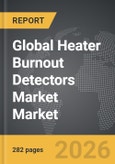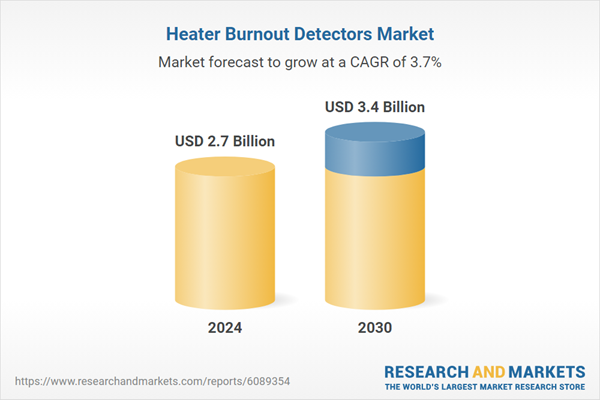Global Heater Burnout Detectors Market - Key Trends & Drivers Summarized
Why Are Heater Burnout Detectors Critical for Industrial Process Safety and Equipment Longevity?
Heater burnout detectors are essential diagnostic components used to monitor the functional integrity of electric heaters in industrial systems. These devices detect when a heating element has failed or is operating outside safe parameters, triggering alarms or system shutdowns to prevent overheating, equipment damage, or production loss. In manufacturing environments where thermal processes are mission-critical - such as plastic extrusion, semiconductor fabrication, chemical processing, and food manufacturing - the early detection of heater failure ensures process continuity and safety.Unmonitored heater failures can result in inconsistent product quality, increased downtime, and, in extreme cases, fire hazards or damage to sensitive equipment. Burnout detectors provide real-time alerts that allow maintenance teams to replace or isolate faulty heaters before secondary issues arise. As factories move toward predictive maintenance and real-time operational monitoring, heater burnout detection is becoming a standard part of advanced thermal control systems.
How Are Technological Innovations Enhancing Detection Precision and Integration?
Modern heater burnout detectors are becoming smarter and more adaptable to complex process environments. These detectors use resistance change monitoring, ground fault sensing, and open circuit detection to identify subtle faults in heater performance. Newer systems can distinguish between single-phase and multi-phase heater failures, monitor multiple zones simultaneously, and support integration with PLCs, SCADA systems, and industrial IoT networks.Miniaturized sensors with enhanced signal resolution and interference immunity are now being embedded into compact control panels and distributed automation systems. Detectors with self-diagnostics and programmable thresholds provide precise calibration tailored to different heater types (e.g., cartridge, band, tubular). Wireless connectivity and cloud-based analytics are also emerging, enabling remote monitoring and predictive failure alerts based on historical thermal profiles and runtime data.
Which Sectors and Regions Are Expanding Their Use of Burnout Detection Systems?
Industries with heavy reliance on continuous thermal operations - such as plastics, packaging, semiconductors, pharmaceuticals, and aerospace - are primary adopters of heater burnout detectors. These sectors require consistent heating for extrusion, molding, sterilization, wafer processing, and heat treatment. Food and beverage processors also deploy burnout detection in ovens, fryers, and sterilization units to maintain compliance with safety and hygiene standards.North America and Europe dominate the market due to advanced manufacturing facilities and stringent safety regulations. Asia-Pacific is witnessing rapid adoption, particularly in China, South Korea, and Taiwan, where high-volume electronics and industrial automation are widespread. As Industry 4.0 initiatives expand across emerging economies, more facilities are retrofitting or embedding heater burnout detectors as part of predictive maintenance programs and smart factory frameworks.
The Growth in the Heater Burnout Detectors Market Is Driven by Several Factors
The growth in the heater burnout detectors market is driven by increased reliance on automated thermal processes, the rising cost of unplanned downtime, and the growing emphasis on equipment safety and longevity. Industries are under pressure to maximize throughput while minimizing risks associated with thermal equipment failure. Heater burnout detectors help meet these goals by providing early warnings that prevent process disruptions and secondary equipment damage.Advances in sensing technology, digital communication protocols, and machine learning analytics are expanding the utility of burnout detectors as intelligent, networked devices. The push for predictive maintenance, operational efficiency, and compliance with industrial safety standards is further encouraging their adoption across sectors. As manufacturers modernize legacy systems and invest in real-time monitoring tools, heater burnout detectors are emerging as indispensable components of next-generation process safety architectures.
Report Scope
The report analyzes the Heater Burnout Detectors market, presented in terms of market value (US$). The analysis covers the key segments and geographic regions outlined below:- Segments: Type (Single-Phase Heater, Three-Phase Heater); Application (Plastic Extrusion Injection Molding, Tank Heaters, Process Heaters, Stalled Motor Detector, Other Applications).
- Geographic Regions/Countries: World; United States; Canada; Japan; China; Europe (France; Germany; Italy; United Kingdom; Spain; Russia; and Rest of Europe); Asia-Pacific (Australia; India; South Korea; and Rest of Asia-Pacific); Latin America (Argentina; Brazil; Mexico; and Rest of Latin America); Middle East (Iran; Israel; Saudi Arabia; United Arab Emirates; and Rest of Middle East); and Africa.
Key Insights:
- Market Growth: Understand the significant growth trajectory of the Single-Phase Heater segment, which is expected to reach US$2.2 Billion by 2030 with a CAGR of a 3.1%. The Three-Phase Heater segment is also set to grow at 4.9% CAGR over the analysis period.
- Regional Analysis: Gain insights into the U.S. market, valued at $747.6 Million in 2024, and China, forecasted to grow at an impressive 6.8% CAGR to reach $682.5 Million by 2030. Discover growth trends in other key regions, including Japan, Canada, Germany, and the Asia-Pacific.
Why You Should Buy This Report:
- Detailed Market Analysis: Access a thorough analysis of the Global Heater Burnout Detectors Market, covering all major geographic regions and market segments.
- Competitive Insights: Get an overview of the competitive landscape, including the market presence of major players across different geographies.
- Future Trends and Drivers: Understand the key trends and drivers shaping the future of the Global Heater Burnout Detectors Market.
- Actionable Insights: Benefit from actionable insights that can help you identify new revenue opportunities and make strategic business decisions.
Key Questions Answered:
- How is the Global Heater Burnout Detectors Market expected to evolve by 2030?
- What are the main drivers and restraints affecting the market?
- Which market segments will grow the most over the forecast period?
- How will market shares for different regions and segments change by 2030?
- Who are the leading players in the market, and what are their prospects?
Report Features:
- Comprehensive Market Data: Independent analysis of annual sales and market forecasts in US$ Million from 2024 to 2030.
- In-Depth Regional Analysis: Detailed insights into key markets, including the U.S., China, Japan, Canada, Europe, Asia-Pacific, Latin America, Middle East, and Africa.
- Company Profiles: Coverage of players such as 3M, Ardmel Group, Cangnan Huaxiang Textile Co., Ltd., DuPont Teijin Films, Gaska Tape Inc. and more.
- Complimentary Updates: Receive free report updates for one year to keep you informed of the latest market developments.
Some of the 42 companies featured in this Heater Burnout Detectors market report include:
- ABB Ltd.
- Autonics Corporation
- Caloritech (Chromalox)
- Fuji Electric Co., Ltd.
- Honeywell International Inc.
- Industrial Controls & Drives India
- JAKI Enterprise Co., Ltd.
- Mitsubishi Electric Corporation
- NK Technologies
- Omron Corporation
- Panasonic Corporation
- Pepperl+Fuchs SE
- Rockwell Automation, Inc.
- Schneider Electric SE
- Siemens AG
- TE Connectivity Ltd.
- Texas Instruments Incorporated
- Yokogawa Electric Corporation
- ZIEHL industrie-elektronik GmbH + Co.
- ZPA Smart Energy a.s.
This edition integrates the latest global trade and economic shifts into comprehensive market analysis. Key updates include:
- Tariff and Trade Impact: Insights into global tariff negotiations across 180+ countries, with analysis of supply chain turbulence, sourcing disruptions, and geographic realignment. Special focus on 2025 as a pivotal year for trade tensions, including updated perspectives on the Trump-era tariffs.
- Adjusted Forecasts and Analytics: Revised global and regional market forecasts through 2030, incorporating tariff effects, economic uncertainty, and structural changes in globalization. Includes historical analysis from 2015 to 2023.
- Strategic Market Dynamics: Evaluation of revised market prospects, regional outlooks, and key economic indicators such as population and urbanization trends.
- Innovation & Technology Trends: Latest developments in product and process innovation, emerging technologies, and key industry drivers shaping the competitive landscape.
- Competitive Intelligence: Updated global market share estimates for 2025, competitive positioning of major players (Strong/Active/Niche/Trivial), and refined focus on leading global brands and core players.
- Expert Insight & Commentary: Strategic analysis from economists, trade experts, and domain specialists to contextualize market shifts and identify emerging opportunities.
Table of Contents
Companies Mentioned (Partial List)
A selection of companies mentioned in this report includes, but is not limited to:
- ABB Ltd.
- Autonics Corporation
- Caloritech (Chromalox)
- Fuji Electric Co., Ltd.
- Honeywell International Inc.
- Industrial Controls & Drives India
- JAKI Enterprise Co., Ltd.
- Mitsubishi Electric Corporation
- NK Technologies
- Omron Corporation
- Panasonic Corporation
- Pepperl+Fuchs SE
- Rockwell Automation, Inc.
- Schneider Electric SE
- Siemens AG
- TE Connectivity Ltd.
- Texas Instruments Incorporated
- Yokogawa Electric Corporation
- ZIEHL industrie-elektronik GmbH + Co.
- ZPA Smart Energy a.s.
Table Information
| Report Attribute | Details |
|---|---|
| No. of Pages | 282 |
| Published | February 2026 |
| Forecast Period | 2024 - 2030 |
| Estimated Market Value ( USD | $ 2.7 Billion |
| Forecasted Market Value ( USD | $ 3.4 Billion |
| Compound Annual Growth Rate | 3.7% |
| Regions Covered | Global |









